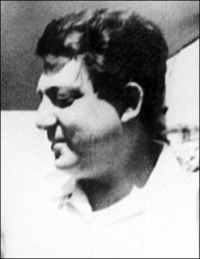Homage To Our Martyred Intellectuals
Dr Mohammed Fazle Rabbee
Remembering my father
Dr Nusrat Rabbee
DR Md Fazle Rabbee, an internationally renowned cardiologist, was lifted from his house at 75 Jalpaiguri Lane in Shiddeswari, Dhaka on Wednesday, 15th December, 1971 at 4PM by Pakistani army and local razakars. His wife, (late) Dr Mrs Jahan Ara Rabbee, risked her life by appealing to various Pakistani army officials, but to no avail. He was a brilliant man of science and had limited participation in organised religion. However, he maintained a strong identity of his Bengali descent. He was an avid connoisseur of Bangali arts and culture. He personally drove his children every week to lessons by famous artistes, like Mrs Firoza Begum and Mr. Kamol Das Gupta to learn the songs of Kazi Nazrul Islam and Rabindranath Tagore. Dr Rabbee designed clinical studies of communicable diseases that are the main causes of death of children and adults in developing countries, like Bangladesh. As a clinician, he took a holistic approach to medicine and identified the roots of illness wherever possible, for example, poverty or psychological distress around family issues. He believed in combining the best of medicine with compassion for the patient. For his poor patients from around the country, this popular doctor, gave free medical treatment and often medicine, transportation and hospitalisation costs. He was also extremely well liked by child patients, because he took the time to interact with them and understand their clinical symptoms. At home, this popular doctor was a kind and compassionate father and husband. Even though he worked from 7am to 10:30 pm most days, he often rushed home to read bedtime stories to his own children or to go to find ice cream at midnight in the city with his beloved wife. As 1971 approached, Dr Rabbee became very concerned about the increasing ill treatment of Banglis by the Pakistani government. He himself faced such prejudices when he was questioned about his success in medicine and popularity as a professor by Pakistani government in 1969. Before his death, he was selected to receive the Best Professor award in Pakistan, which he declined. On 27th March 1971, he was very disturbed when he visited Dhaka medical college with his wife and saw the extent of the massacre. He asked the attending physicians not to sign death certificates for all the people who were massacred. Dr. Rabbee envisioned a country where poverty is eliminated and the people are free to choose which language to speak and which God to worship. On15th December, before he was lifted from his house by the Pakistani army, he risked his life by driving his own car in the middle of the curfew to make a house call on a patient, who was his trusted employee and an urdu-speaking individual, hailing from West Pakistan. Dr. Rabbee and others like him were killed in 1971 because they believed in a free and modern society where people are empowered to live a better life and where dreams come true for the common person. Even though these people have been silenced, their vision of peace and prosperity of Bangladesh must live on in current and future generations.
|

|